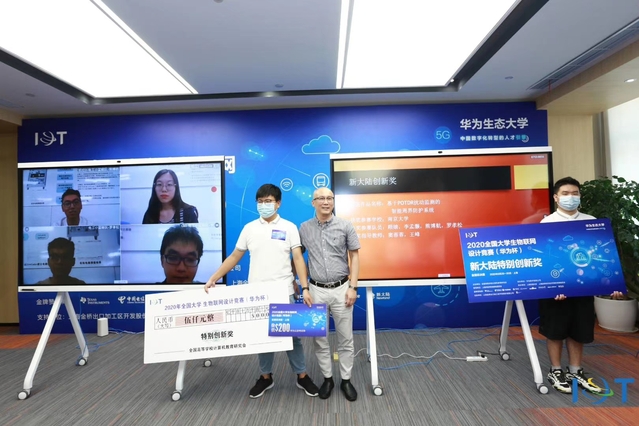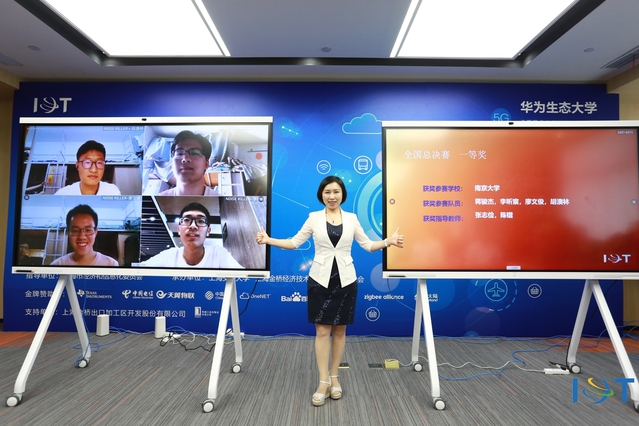The Nanjing University teams won two first prizes, two second prizes, two third prizes and one Newland Innovation Prize at the National Undergraduate Internet of Things (IoT) Design Contest (Huawei sponsored), which dropped its curtain on August 30.
Despite the fallout of the Covid-19 epidemic, the contest attracted more than 1,360 teams with 6,500 students and 1,400 teachers from NJU and 560 other universities such as Shanghai Jiao Tong University, Zhejiang University, Xi’an Jiaotong University, and Harbin Institute of Technology.
A total of 124 teams stood out after the online preliminaries and finals in five regions. The contest grew more intense when it reached the online oral defense and the final between the top six teams.
At last, NJU’s two projects, POTDR-Interference-Monitor-Based Intelligent Perimeter Protection System and FPGA-&-DSP-Based Intelligent Noise-Reduction Headrest won first prizes, and the perimeter protection system was also awarded the Newland Innovation Prize.

The POTDR-Interference-Monitor-Based Intelligent Perimeter Protection System wins Newland Innovation Prize

The FPGA&DSP-Based Intelligent Noise-Reduction Headrest wins the first prize in the national final
TheIntelligent Perimeter Protection System is a joint project by students from the School of Electronic Science and Engineering and the College of Engineering and Applied Sciences. By utilizing the optical fiber sensing technology, the joint team achieved the covert protection of the target, with no blind spot.
Specifically, the team creatively made use of the optical properties produced by optical fiber media under interference, so that they can predict and distinguish multiple motions of persons at a fixed location and timing in a measured space.
What’s more, they use the sensor’s data uploading module provided by the Newland Cloud Platform and the Web real-time data presentation framework to realize the digital monitoring and alarming mechanism behind the scene.
Therefore, the project has provided a whole set of digital security solution for the places demanding high level of security such as museums and archive rooms.
TheIntelligent Noise-Reduction Headrest is also a joint project by students from the School of Electronic Science and Engineering and the School of Physics.
By using an active noise reduction system based on FPGA & DSP, they have proposed a cost-effective Intelligent Noise-Reduction Headrest. DSP is responsible for real-time calculation of the sound field and FPGA is responsible for data acquisition, signal modulation and control signal generation. The project makes full use of the advantages of FPGA and DSP and it shortens time delay from analog to digital of the active noise reduction system and, therefore, achieves excellent noise reduction effects.
Different from the noise-reduction earphones, the headrest is very comfortable and there is no need to worry about ear damaging after wearing it for a long time. In noisy places such as stations, airports, and airplanes, the noise-reduction headrest can provide people with a comfortable experience and it enjoys broad prospects for application.
It is learned that the National Undergraduate IoT Design Contest is the only academic competition in the Internet of Things field and it is initiated by the National Advisory Committee on the Teaching of College-Level Computer Majors under the Ministry of Education.
Internet of Things (IoT) refers to the internetworking of physical devices. By using the IoT as a platform, the competition aims to cultivate students’ vitality of creation, innovation and entrepreneurship and to promote higher education on innovation and entrepreneurship.
The competition kicked off on May 7 with the National Experimental Teaching Demonstration Center of the Electronic Information Specialty making an online presentation to all NJU students on the competition, interpreting its rules and procedures, and offering guidance on writing design reports and shooting videos for works.
Altogether, Nanjing University sent out 17 teams with 76 undergraduates from School of Electronic Science and Engineering, Department of Computer Science and Technology, College of Engineering and Applied Sciences, Software Institute, School of Physics, Department of Mathematics, School of Management and Engineering, School of the Environment, and Business School.
The projects of these teams covered such areas as intelligent manufacturing, noise management, safety patrolling, medical equipment, and intelligent transportation.
The wide range of areas reflects the interdisciplinary characteristics of the IoT technology.